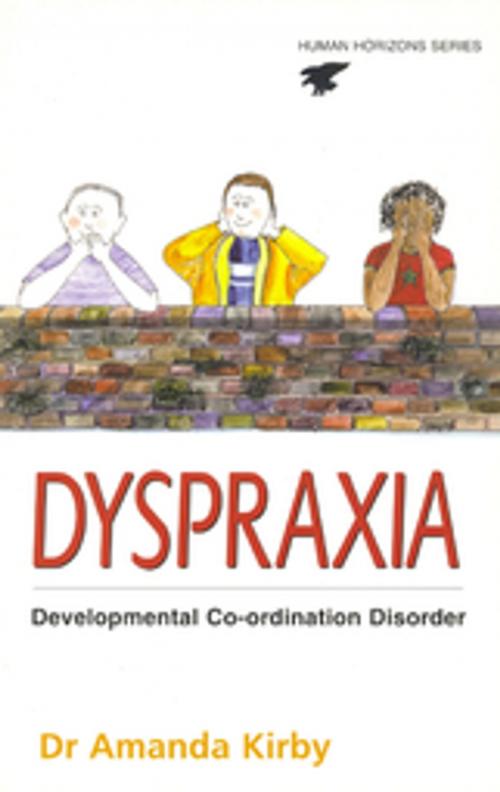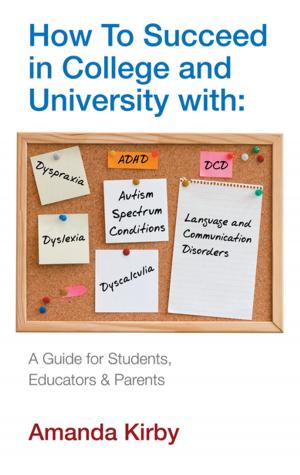Dyspraxia
Developmental Co-Ordination Disorder
Nonfiction, Health & Well Being, Health, Ailments & Diseases, Physical Impairments, Reference & Language, Education & Teaching, Special Education| Author: | Amanda Kirby Dr. | ISBN: | 9780285639393 |
| Publisher: | Profile | Publication: | February 1, 2011 |
| Imprint: | Souvenir Press | Language: | English |
| Author: | Amanda Kirby Dr. |
| ISBN: | 9780285639393 |
| Publisher: | Profile |
| Publication: | February 1, 2011 |
| Imprint: | Souvenir Press |
| Language: | English |
Dyspraxia is truly a hidden handicap that may go undiagnosed until adulthood. A child with dyspraxia has problems co-ordinating his or her movements, and will appear clumsy. This informative, practical book is intended to help parents and teachers, with innovative ideas that they can use to encourage the child and help to improve motor skills. It looks at the child at every stage, through early years at home, at nursery school, primary and secondary school and into adulthood. Most parents are desperate for information about causes and symptoms and that information is given in simple terms, as well as information about diagnostic procedures and the characteristics of the condition. While dyspraxia cannot be cured, it can be overcome and its effects minimised. With the aid of this book a parent can ensure that their child is equipped with strategies to lead as normal a life as possible.
Newly revised and updated this is the definitive parents' guide to dyspraxia, also known as Developmental Co-ordination Disorder (DCD). Dyspraxia affects one seventh of all children. Dyspraxia is a condition that causes co-ordination problems. It is a hidden handicap, the children who suffer from it look the same as their friends but are dismissed as 'clumsy' rather than treated as children coping with a learning difficulty. Dyspraxia can often go undiagnosed until adulthood and is often mistaken for other conditions, such as autism, dyslexia or attention deficit disorder.
In this practical and authoritative book Amanda Kirby asks the questions parents would like answered, gives a comprehensive outline of what dyspraxia is and how it can affect a child and offers practical advice on how to help a child overcome this problem through-out their life from pre-school to adulthood. There are techniques that can be used by parents in the home to improve a child's co-ordination, as well as positive ways to cope with the emotional reaction of both parents and children to the diagnosis of dyspraxia.
What parents need most of all is information - information about causes, symptoms and other possible conditions, practical ways to improve your child's condition and how to help them to live independently as adults. This book will fulfil the need for relevant information for parents and teachers, medical professionals and play leaders, in a concise, readable and comprehensive way.
Dyspraxia is truly a hidden handicap that may go undiagnosed until adulthood. A child with dyspraxia has problems co-ordinating his or her movements, and will appear clumsy. This informative, practical book is intended to help parents and teachers, with innovative ideas that they can use to encourage the child and help to improve motor skills. It looks at the child at every stage, through early years at home, at nursery school, primary and secondary school and into adulthood. Most parents are desperate for information about causes and symptoms and that information is given in simple terms, as well as information about diagnostic procedures and the characteristics of the condition. While dyspraxia cannot be cured, it can be overcome and its effects minimised. With the aid of this book a parent can ensure that their child is equipped with strategies to lead as normal a life as possible.
Newly revised and updated this is the definitive parents' guide to dyspraxia, also known as Developmental Co-ordination Disorder (DCD). Dyspraxia affects one seventh of all children. Dyspraxia is a condition that causes co-ordination problems. It is a hidden handicap, the children who suffer from it look the same as their friends but are dismissed as 'clumsy' rather than treated as children coping with a learning difficulty. Dyspraxia can often go undiagnosed until adulthood and is often mistaken for other conditions, such as autism, dyslexia or attention deficit disorder.
In this practical and authoritative book Amanda Kirby asks the questions parents would like answered, gives a comprehensive outline of what dyspraxia is and how it can affect a child and offers practical advice on how to help a child overcome this problem through-out their life from pre-school to adulthood. There are techniques that can be used by parents in the home to improve a child's co-ordination, as well as positive ways to cope with the emotional reaction of both parents and children to the diagnosis of dyspraxia.
What parents need most of all is information - information about causes, symptoms and other possible conditions, practical ways to improve your child's condition and how to help them to live independently as adults. This book will fulfil the need for relevant information for parents and teachers, medical professionals and play leaders, in a concise, readable and comprehensive way.















